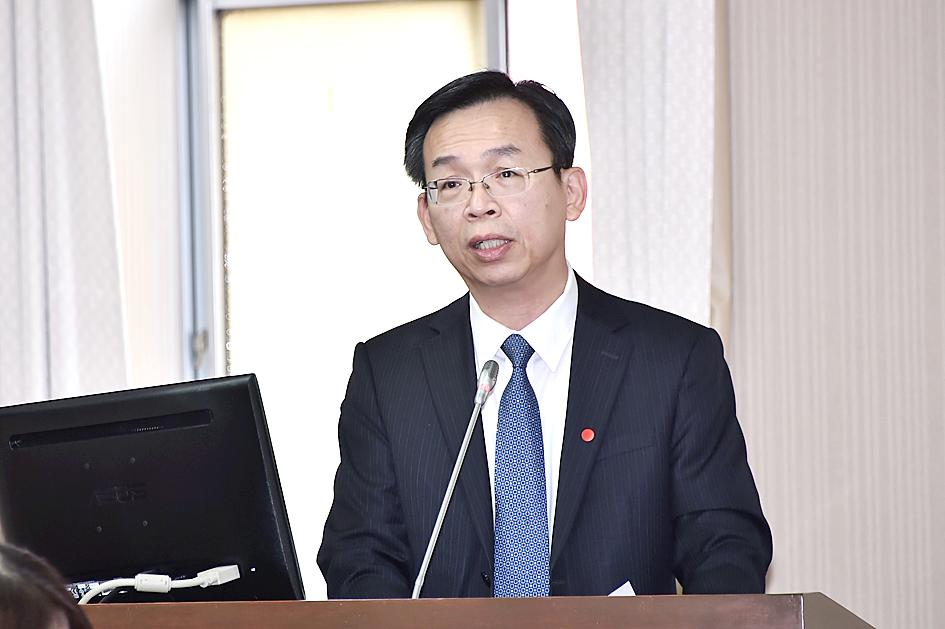Government bonds would be issued to increase the Civil Aeronautics Administration (CAA) Operating Fund by NT$30 billion (US$1.04 billion), CAA Director-General Lin Kuo-hsien (林國顯) confirmed yesterday.
Lin made the statement at a meeting of the legislature’s Transportation Committee, which was scheduled to review the budget plans submitted by the CAA and Taoyuan International Airport Corp (TIAC) for the 2021 fiscal year.
Democratic Progressive Party (DPP) Legislator Lee Kun-tse (林昆澤) said that the Ministry of Transportation and Communications has rolled out a series of relief packages and travel subsidies that have temporarily stabilized the market.

Photo: Tu Chien-jung, Taipei Times
However, the International Air Transport Association has forecast that the global air transport market would not return to the level seen last year until 2024, which means that international flight carriers have yet to face their toughest trials, Lee said.
Lin said that the CAA and TIAC have given excessively rosy forecasts for the air transport market in the next fiscal year.
TIAC’s budget proposal said that the number of the passengers accessing Taiwan Taoyuan International Airport is estimated to top 42.84 million for the next fiscal year, down from 49.08 million projected for this fiscal year.
The airport operator estimated that business revenue in the next fiscal year could top NT$20.12 billion, down from NT$22.85 billion in this fiscal year.
“However, the airport was accessed by about 7.16 million passengers in total as of September, with about 6.75 million accessing the airport from January to March, when the nation’s borders were still open,” Lee said.
“While the airport operator projected that it would receive NT$4.638 billion in airport service fees next year, it only collected NT$739 million between January and September, which would create a budget shortfall of more than 60 percent,” Lee said.
Lee asked Lin, who also serves as TIAC acting chairman, if government bonds would be considered to help raise funds.
Lin said that the budget plan was stipulated at the beginning of last year, but the COVID-19 pandemic broke out at about the end of January and the beginning of February.
Despite the steep decline in revenue, the airport’s expenditure would increase, as it needs funds to maintain airport facilities and build a third runway and terminal, he said.
“Currently, we can still endure with the CAA Operating Fund. However, because of a decrease in revenue, we have asked permission from the Ministry of Finance to issue government bonds of NT$30 billion to raise money for operating funds,” Lin said.
Additional funds needed by the airport would be secured through short-term loans, he said.
This would be the first time in 48 years that the government has issued bonds to raise money for the CAA Operating Fund.
The decline in passengers accessing the airport also has affected the Tourism Development Fund, which is partially funded by airport service fees.
Asked how the government plans to replenish the almost depleted Tourism Development Fund, Minister of Transportation and Communications Lin Chia-lung (林佳龍) said that it would seek funds allocated by the Executive Yuan and raise NT$6 billion by issuing government bonds, adding that the Tourism Bureau is making detailed assessments of the situation.

A preclearance service to facilitate entry for people traveling to select airports in Japan would be available from Thursday next week to Feb. 25 at Taiwan Taoyuan International Airport, Taoyuan International Airport Corp (TIAC) said on Tuesday. The service was first made available to Taiwanese travelers throughout the winter vacation of 2024 and during the Lunar New Year holiday. In addition to flights to the Japanese cities of Hakodate, Asahikawa, Akita, Sendai, Niigata, Okayama, Takamatsu, Kumamoto and Kagoshima, the service would be available to travelers to Kobe and Oita. The service can be accessed by passengers of 15 flight routes operated by

MORE FALL: An investigation into one of Xi’s key cronies, part of a broader ‘anti-corruption’ drive, indicates that he might have a deep distrust in the military, an expert said China’s latest military purge underscores systemic risks in its shift from collective leadership to sole rule under Chinese President Xi Jinping (習近平), and could disrupt its chain of command and military capabilities, a national security official said yesterday. If decisionmaking within the Chinese Communist Party has become “irrational” under one-man rule, the Taiwan Strait and the regional situation must be approached with extreme caution, given unforeseen risks, they added. The anonymous official made the remarks as China’s Central Military Commission Vice Chairman Zhang Youxia (張又俠) and Joint Staff Department Chief of Staff Liu Zhenli (劉振立) were reportedly being investigated for suspected “serious

ENHANCING EFFICIENCY: The apron can accommodate 16 airplanes overnight at Taoyuan airport while work on the third runway continues, the transport minister said A new temporary overnight parking apron at Taiwan Taoyuan International Airport is to start operating on Friday next week to boost operational efficiency while the third runway is being constructed, the Ministry of Transportation and Communications said yesterday. The apron — one of the crucial projects in the construction of the third runway — can accommodate 16 aircraft overnight at the nation’s largest international airport, Minister of Transportation and Communications Chen Shih-kai (陳世凱) told reporters while inspecting the new facility yesterday morning. Aside from providing the airport operator with greater flexibility in aircraft parking during the third runway construction,

American climber Alex Honnold is to attempt a free climb of Taipei 101 today at 9am, with traffic closures around the skyscraper. To accommodate the climb attempt and filming, the Taipei Department of Transportation said traffic controls would be enforced around the Taipei 101 area. If weather conditions delay the climb, the restrictions would be pushed back to tomorrow. Traffic controls would be in place today from 7am to 11am around the Taipei 101 area, the department said. Songzhi Road would be fully closed in both directions between Songlian Road and Xinyi Road Sec 5, it said, adding that bidirectional traffic controls would